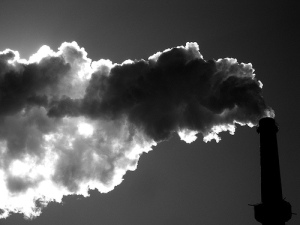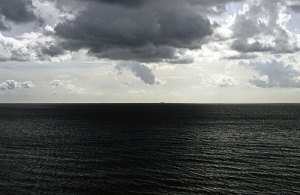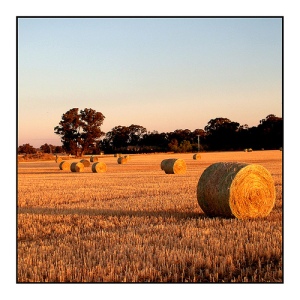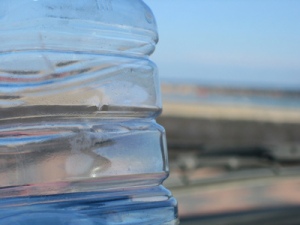What is environmental justice?
Image from Flickr by Senor Codo
This is the question posed by Green Daily blogger, Leslie Wolcott.
Wolcott asks: “So what is a fair way to deal with the seemingly inevitable pollution that results from the way we live?”
One American environmental organisation, located in the Pilsen neighbourhood of Chicago, is fighting to create the answer to that question.
Pilsen Environmental Rights and Reform Organisation (PERRO) is a grass roots community formed in 2004, by a group of local residents who wanted to challenge the amount of pollution in the area they live .
The group aims to:
- raise awareness about the levels of pollution in Pilsen and reduce them
- promote a clean and healthy environment for all, regardless of race or class
- encourage residents, businesses, industry and social and religious organisations to communicate, in order to create a healthier community for all to live in
- achieve this without causing jobs or business to be lost
Concern over pollution levels
Wolcott says: “Pilsen is a middle to low income neighborhood in Chicago, and PERRO began in 2004 when local residents wanted to voice their concerns about the Kramer facility, a local brass and bronze smelting plant located in the area.”
PERRO conducted tests for lead and other toxins in the soil and on surfaces in Pilsen and found very high levels in some samples.
This prompted a U.S. Environmental Protection Agency investigation into lead levels in and around the H. Kramer facility.
Victory
In 2006, the EPA reached an agreement with the H. Kramer and Co. on alleged clean air violations at the company’s brass and bronze manufacturing plant.
Wolcott got to speak with Dorian Breuer, a representative from PERRO, after attending a presentation about coal at the Chicago Green Fest.
Wolcott asked Breuer for his definition of environmental justice and in reply he said:
“How environmental justice works from our perspective at least as a community that lives right in amongst two coal plants in the city of Chicago is…if these 2 coal plants, the largest single sources of pollution in all of Chicago…were located in a different neighborhood–there are other neighborhoods in Chicago, for example one of the wealthiest neighborhoods in Chicago is Lincoln Park, which happens to be predominantly white, or Caucasian American– if the coal plant was located in the middle of that neighborhood, we end up wondering, would there be as much difficulty in the community…
Environmental injustice
“Questions like why is it that simply because it is located in a lower income community, in a community of color… is it so difficult to get [these polluted areas and plants that continue to pollute] cleaned up? That’s what we think of as environmental injustice.”
For ways you can help, including making a donation to PERRO or offering your skills, visit their website where there is also information about joining a PERRO committee.
Sources: Green Daily blog by Leslie Wolcott and PERRO
For further environmental news stories visit ENO – www.environmentalnewsonline.com
Hong Kong seas in deep trouble
Image from Flickr by Tom Weilenmann
The World Wildlife Fund urges people to sign a petition to save what’s left of Hong Kong’s natural marine life.
WWF Hong Kong launched the “Save Our Seas” campaign in 2004, but it’s waters are still suffering.
The campaign aims to:
- protect marine biodiversity
- restore fisheries
- create new alternative jobs for fishermen
Ecological system on verge of collapse
Hong Kong’s seas were once abundant with marine life, including 80 species of hard coral and approximately 1,000 species of fish.
However, they are now suffering from overfishing and pollution caused by human beings.
WWF claims that Reef sharks are almost extinct, whilst Manta rays and the Green turtle have not been seen in years.
WWF‘s proposed solution:
- stop fishing in existing Marine Parks, turning them into real sancturies that can truly protect marine life.
- operate 10% of Hong Kong’s waters as ‘no-take zones,’ banning fishing and other disturbances in these areas
- stop uncontrolled fishing, by licensing all commercial fishing boats and setting catch quotas.
Take Action
Sign the petition and ask the Chief Executive of Hong Kong, Mr. Donald Tsang Yam – kuen to stop Hong Kong’s ecological system from collapsing.
Sources: WWF Passport and WWF Hong Kong
For further environmental news stories visit ENO – www.environmentalnewsonline.com
A renewed sense of hope at EcoCity World Summit 2008
An example of a green building from Flickr by sillydog
Delegates from across the globe are gathering this week in San Francisco to share ideas and innovations to advance the international movement for sustainable cities.
A WorldChanging blog by Holly Pearson highlights the seventh international EcoCity World Summit, which will be hosted by Oakland-based EcoCity Builders and partner organisations.
The international community of inspired change-makers are addressing the world’s environmental problems, whilst thinking of ” truly sustainable, ecologically, healthy and socially just” solutions.
Topics of agenda include
- Ecological city design
- Green architecture, green building
- Renewable energy
- Restoration of natural ecologies
- Recycling
- Green business incentives
- Ecological footprint
Why are cities the main point of focus?
Richard Register, President of EcoCity Builders, explains that cities are, “directly connected to the state of the planet’s environment as well as to local problems and solutions, both ecological and economic.”
Mr Register went on to suggest that cities could run on a fraction of the energy and generate a fraction of the ecological impact if they were really well-designed and efficient.
The EcoCity World Summit Main Conference concludes tomorrow, with main topics of discussion being architecture, urban design, land use and government.
To register click here.
Sources:WorldChanging blog by Holly Pearson and EcoCity World Summit 2008
For further environmental news stories visit ENO – www.environmentalnewsonline.com
Earth First! blockades entrance to coal plant
On Tuesday morning, activists from Blue Ridge Earth First! established a blockade at the entrance to Dominion Power’s James River headquarters in Richmond, Virginia.
Three activists locked themselves to one another, blocking the only road in and out of the office complex for almost an hour.
The campaign was against the building of Dominion’s proposed new coal-fired power plant in Wise County, Virginia.
Supporters stood-by holding signs and banners demanding, ‘No Coal for Virginia.’
Why Chesapeake Climate Action Network believes the Wise County Coal Plant is bad for Virginia
- The plant would emit 5.4m tons of Co2 annually.
- Mountaintop removal coal mining would be exacerbated.
- 1476 jobs would be lost.
- It will will not be clean.
- The plant will not meet the Governor’s own carbon reduction goals.
- Opposition to the plant keeps growing.
- Virginia hasn’t invested in renewables or efficiency
Help deliver the mile-long petition with hundrerds of others on May 8th in Richmond.
Join CCAN in collecting 50,000 petition signatures by May 1st by clicking here.
Sources: CCAN
For further environmental news stories visit ENO – www.environmentalnewsonline.com
Money does grow on trees
Image from Flickr by heritagefutures
Farmers in North Queensland, Australia have recently bought 20,000 diesel-producing trees in an experiment to see if they can self-sustain their agricultural production.
Australian farmers are attempting to essentially become self-sustainable by relying on special diesel-producing trees called Copaifera langsdorfii.
However..
Michael d’Estries , a regular contributer to Groovy Green says: “As with anything almost too good to be true, there is one catch.
“100 trees will only produce about 25 barrels of diesel fuel annually. Additionally, that fuel will only last a couple months in terms of keep.”
That said, Australian farmers are hoping the trees will provide a consistent and cheap source of fuel for their machinery.
According to d’Estries, the trees are expected to continue producing fuel for about 10 years.
Eco-friendly
Steve N Lee commented on Warren McLaren‘s article, ‘The Diesel Tree: Grow Your Own Oil,’ on Treehugger sounding surprised but pleased by the news: “I still find this hard to believe. Not just for the fuel production, but for the fact that we don’t need to harvest the plant, i.e. kill it, to get what we want from it, but simply to encourage it’s long term growth.
“The tapping of the fuel will also be vastly more eco-friendly than traditional oil drilling.”
In about 15 years time, we should be able to see just how well the investment has paid off for Australian farmers.
Sources: Groovy Green and Treehugger
For further environmental news stories visit ENO – www.environmentalnewsonline.com
Defenders of Wildlife call for an end to unnecessary slaughter
Image from Flickr by Heartlover1717
Defenders of Wildlife has revealed that a record number of bison have been slaughtered in America.
In a press release, DoW has said over 1,100 bison have been slaughtered this winter around Yellowstone National Park in Montana.
DoW suggests that the removal of nearly one-quarter of the park’s bison population dramatically demonstrates the need to reform the rules governing the last stronghold for America’s wild bison.
America’s last free-roaming wild bison
Jamie Rappaport Clark, executive vice president of DoW said: “Yellowstone’s bison are America’s bison, the last pure descendants of the tens of millions that once thundered through the American landscape.
“Yet as soon as they set foot outside of Yellowstone Park, even onto publicly owned national forests, they are harassed and killed. This is truly one of the worst examples of wildlife management in the country.”
Montana Department of Livestock is responsible for indiscriminately slaughtering bison that venture outside of the park in winter looking for food.
Why are bison being slaughtered?
DoW claim that faulty science and biased politics have led to regular winter roundups of bison in order to be killed due to the fear they might transmit a disease called brucellosis to cattle grazing on public lands.
However, there has never been a documented case of a bison transmitting brucellosis to cattle in the wild and the vast majority of bison killed for this reason are not even tested for the disease beforehand.
What action can be taken to stop unnecessary slaughters?
You can write to the Montana Promotion Division and ask for sensible management of these endangered animals.
To do this online, click here.
For further environmental news stories visit ENO – www.environmentalnewsonline.com
Earth Hour 2008 – worth an hour in the dark?
Image from Flickr by aussiegall
What is it?
In two days time, millions of people all over the world are expected to unite as one global community in the World Wildlife Fund’s effort to inspire people to take action on climate change.
WWF is asking everyone to take part in Earth Hour on March 29th between 8-9pm by switching off all lights.
Scepticism
However, despite so many people coming together for a seemingly worthy cause, there are still some sceptics that question whether fighting global warming is really necessary or if global warming even exists at all.
Panagiotis Chatzistamoulis from Greece is a regular contributer to a Facebook group, Global Warming Is Junk Science, and feels the same way he did about Americans who supported the war against Iraq’s weapons of mass destruction.
“They were conned. They thought they were doing the right thing.”
JunkScience.com is a website that claims to provide, “The Real ‘Inconvenient Truth’ ” in response to Al Gore’s documentary which highlighted the issue of global warming to the world.
The website suggests that there are “basic misconceptions” of the Earth and goes on to explain the ‘facts’.
To read JunkScience.com’s version of the truth, click here.
Alternatively, get involved with Earth Hour and sign up here.
For further environmental news stories visit ENO – www.environmentalnewsonline.com
Japanese Open Fire on Sea Shepherd Crew – Time to Boycott Japan?
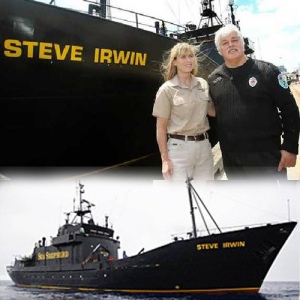
Terri Irwin with Captain Paul Watson in front of the ‘Steve Irwin’ from Flickr by guano
Rebecca Sherman from London is the creator of a Facebook group which proposes that we ‘Boycott Japanese Products Until Japan Ends Whaling!‘
Just last Friday, a clash between the crew of the Sea Shepherd vessel Steve Irwin, and the Japanese whaling ship Nisshin Maru, turned violent when the Japanese Coast Guard began to throw flash grenades at the crew of the Steve Irwin inside the Australian Territorial Zone .
The Sea Shepherd Conservation Society
SSCS is an international non-profit organisation whose mission is to end destruction of habitat and slaughter of wildlife in the world’s oceans in the interest of conservation.
Captain struck by bullet
Captain Paul Watson was struck by a bullet in the chest. However, his life was spared when the bullet was stopped by his Kevlar vest and an anti-poaching badge which was worn on his sweater underneath.
Additional injuries were sustained by crewmembers Ashley Dunn and Ralph Lowe. Dunn, 35, from Launceston, Australia suffered a hip injury when he tried to get out of the way of the exploding grenades. Lowe, 33, from Melbourne, Australia received bruises to his back when one of the flash grenades exploded behind him.
Why did this happen?
“Whales are endangered and hunting them has been illegal since 1986. However, under the auspices of The Institute of Cetacean Research, Japan uses a scientific loophole in the ban to continue hunting and killing endangered whales and selling the meat for profit,” says Sherman.
The Japanese Coast Guard was retaliating against Sea Shepherd crewmembers for tossing rotten butter onto the decks to discourage their illegal whaling activities. The clash came after a week long pursuit by the Steve Irwin of the Nisshin Maru, in an effort to stop illegal whaling activities in the Southern Ocean Whale Sanctuary.
Sherman says: “Please boycott Japanese products. Hit Japan wear it hurts. Let them know that you think whale hunting is wrong and it should be stopped.”
Visit www.seashepherd.org for more information on their campaign.
Also check out Sherman’s Facebook group for further details at http://www.facebook.com/group.php?gid=5925369230
Independent Liberal Arts Community Co-op supports West Virginia Bottle Bill
The campaign for a Bottle Bill in West Virginia by Linda Frame of West Virginia’s Citizen Action Group is being backed by the Independant Liberal Arts Community Co-op.
Larry Hammons of ILACC, a group primarily interested in the fight against poverty, is currently drafting an e-mail in support of the campaign to Frame, the Program Manager of the Action Group.
The campaign website states that: “West Virginians use over 1 billion containers each year, the majority of which end up in landfils or along our highways.”
A Bottle Bill would essentially provide incentives for existing recyclers, Solid Waste Authority facilities and new businesses to collect empty beverage containers.
A Bottle Bill will also:
-
increase recycling rates and reduce landfill
-
reduce litter
-
reduce overall burden placed on taxpayers and municipal waste management systems
-
save taxpayers money
-
reduce costs to farmers for damages to crops and livestock caused by litter
-
allow West Virginia to join the other 11 states where Bottle Bills enjoy strong public support
-
help West Virginia comply with the West Virginia Recycling Act and it’s goals
-
create hundreds of jobs
Change is needed
Hammons has his own ideas about why a Bottle Bill is the right step to take: “Why would a company want to use virgin materials when our land fills are overflowing with re-usable glass and metal containers?
“Because it’s cheaper for the corporations. In reality the consumer is paying to despose of these throw away containers. Every time we buy a Coke we are giving the Coca-Cola corporation profit and then we pay to despose of there bi-product.”
Hammons emphasises the fact that these corporations want to appear to be environmentally friendly but still they leave us to throw their products into the landfills. So why are we not re-using the glass, plastic and melting down the aluminum?
A disposable society
In celebration of the Bill, Hammons said: “Recycling costs money. America has become a disposable society. The average Joe feels like his opinion means nothing, that no-one listens, so he does nothing. That’s exactly what the media and these corporations want Joe to do – nothing! If there isnt a cry for change there will be none.”
You can telephone, email or write to the legislators and Governor Manchin and ask them to support the Bottle Bill. Details can be found on www.wvbottlebill.org/
Alternatively, click on this link to be taken to an online petition.
